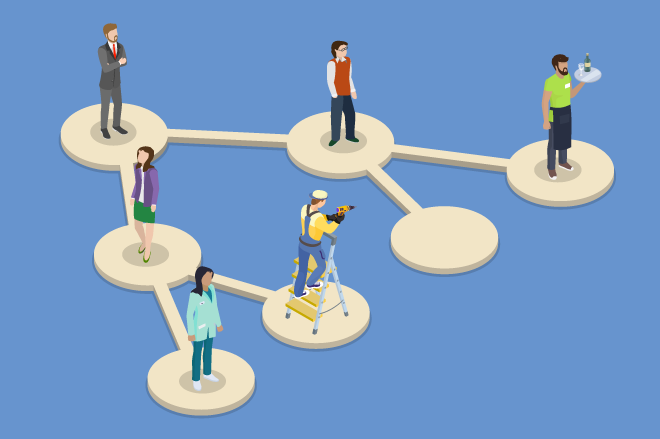Project Approach
This project will describe the development of alternative work arrangements in Norway over the time-period 1995-2020, investigate the consequences of the developments for employers and employees and investigate possible driving forces behind the developments. We will also investigate the role of the developments in EU-law for Norwegian work contracts. Alternative work arrangements includes fixed contracts, temporary agency work and self-employment. Alternative work arrangements will be compared to permanent contract work.
The project has five subprojects. The first three subprojects are quantitative and will use register data, AKU and other relevant surveys. The two last subprojects uses a qualitative (4) and legal (5) approach to the same questions that we ask in the quantitative part.
1. The development in alternative work arrangements over time
This subproject will investigate the share of alternative work arrangements in Norwegian working life over time: in the economy as a whole, across industries, across the income distribution and across different population groups.
2. Consequences for employees and employers
This subproject will investigate the development over time in wage and working conditions, health, working environment, unionization, family and housing. We will also investigate the development over time in transition rates between alternative work, permanent work and out of work. For businesses, we will investigate how the use of alternative work arrangements is related to the companies' productivity and profitability.
Publications subproject 1 and 2
- Final report: Atypical work as main employment relationship 1995–2021. Scope, working conditions and transitions into permanent work.
- Supplemental report for the low-wage committee: Atypical work among low-income individuals in Norway, 1997–2021
- Report: Domestic outsourcing and atypical work in companies. Relations with profitability, wages and direct hirings in the period 2005–2019
- Report: Atypical work in Norway, 1995–2019. Worker welfare and transition probabilities
- Op-ed: Researchers with a new study: It has not become less common to be permanently employed (DN.no)
- Post: Post about hiring in Norwegian working life: Increased inequality between companies – and between groups of employees (DN.no)
3. The importance of labor market regulation
We will investigate how labor market regulation affects the proportion of employees with alternative work arrangements in the Norwegian economy, companies' use of various forms of work arrangements and wage development for different groups of employees.
Publications subproject 3
- Working paper: Lowering the Threshold or Increasing Insecurity? The Distributional Effects of Job Protection Deregulation (ssrn)
- Report: Staffing company hiring and stability of work. An evaluation of the changes in the Working Environment Act 2019.
- Op-ed: Post: Only slightly fewer employees from staffing agencies after tightening (DN.no)
4. Driving forces behind and consequences of alternative work arrangements
This subproject will conduct qualitative interviews with employers, union representatives and employees within the same company in four different industries where digitization and immigration have been applicable.
Publications subproject 4
- Article: Hire or not hire? Employers' labor strategies and reasons for using different forms of affiliation in two industries | Spotlight on working life (idunn.no)
- Report: Employer justifications for different staffing strategies
5. Developments in the legal framework on alternative work arrangements
This project will investigate how the development in EU law towards greater emphasis on promoting social purposes (especially wage and working conditions) will affect the legal framework for alternative work arrangements in Norway.
PrivacyThe project has been approved by our Data Protection Officer SIKT. A DPIA has been carried out. The project includes the project Alternative Work Arrangements and Worker Welfare (ALTWORK). This project receives data from various public registers from Statistics Norway. The researchers do not receive information that directly identifies you, such as name, social security number, postal address or the like. If you believe that the project, for example in its publications, still identifies you, you can complain to the Privacy Ombudsman. The Data Protection Officer will assist you and possibly arrange for changes in collaboration with the project manager. For questions about the processing of privacy information in this project, contact our Data Protection Officer. You can read more about Your rights in our Privacy policy. Also check out Privacy and ethics in our research. |

